
Do you have trouble sleeping at night? You might want to take a look at the type of light you’re exposing yourself to before bed. Recent studies have shown that blue light exposure can prevent people from getting a good night’s sleep. In this article, we will discuss the effects of blue light on sleep and how you can protect yourself from it.
What is blue light?
Blue light is a type of electromagnetic radiation with a short wavelength. It is scattered more easily than other colors because it travels as shorter, smaller waves. This scattering causes the sky to look blue. Blue light also reflects off of surfaces more than other colors, which is why blue walls often look brighter than white walls. Blue light is found naturally in sunlight and is emitted by electronic screens such as computers, cell phones, and TVs. It is visible to the human eye and has been used in various applications such as communication, entertainment, and lighting. In recent years, there has been increasing concern about the effects of blue light on human health.
How Blue Light Affects Us
Studies have shown that blue light can damage the retina, cause digital eye strain, and disrupt sleep patterns. Additionally, blue light exposure has been linked to an increased risk of macular degeneration, a condition that causes vision loss.
The Effect On Sleep
When we are exposed to blue light, our bodies produce less melatonin. Melatonin is a hormone that helps us sleep. Melatonin is a hormone that helps to regulate the body’s natural sleep-wake cycle, and exposure to blue light suppresses its production. This is why staring at screens late at night can make it harder to fall asleep. Blue light mimics the light of day, tricking the brain into thinking it’s time to be awake. Studies have shown that exposure to blue light can cause people to wake up more during the night and have difficulty falling back asleep. This can lead to fatigue and insomnia. In addition to causing insomnia, blue light exposure can also lead to fatigue and eye strain. If you find yourself having trouble sleeping at night, it might be due to the type of light you’re exposing yourself to before bed.
Blue light glasses
These glasses filter out the blue light emitted by digital screens, helping to reduce eye strain and prevent sleeplessness. Blue light glasses are relatively inexpensive and can be easily found online or at your local drugstore. So, if you’re looking for a way to improve your sleep, give them a try.
Screen Filters
There are a variety of different blue light screen filters available, and they can be purchased for use with computers, tablets, and smartphones. In addition to reducing eye strain, blue light filters can also help you to sleep better at night by blocking out the harmful wavelengths of light that can disrupt your natural sleep cycle. And because they attach directly to screens, they are always there when you need them, unlike blue light glasses.
Device Settings
To avoid these negative effects, many devices now come with a night mode feature that filters out blue light. Many devices have a setting that allows you to set a schedule for night mode to activate and deactivate. By using night mode on your devices before bed, you can help reduce the impact of blue light on your sleep.
Avoid Screens Before Bed
Most people know that it’s not a good idea to watch television or stare at a computer screen right before bed. The bright light from the screen can interfere with sleep, and the stimulation of the mind can make it difficult to relax. However, many people don’t realize that even using a smartphone or tablet in the hours leading up to sleep can have similar effects. The blue light emitted by these devices can cause the brain to think it’s still daytime, making it harder to fall asleep. In addition, the constant checking of email and social media can lead to anxiety and racing thoughts, further disrupting the sleep cycle. To avoid these problems, it’s best to avoid screens of all kinds in the hours before bed. Instead, try reading a book or listening to calming music to help you relax and drift off to sleep.
Blue light exposure before bed can disrupt our natural sleep patterns and lead to poor sleep quality. However, there are a few simple things we can do to mitigate the effects of blue light before bed. By following our tips, you can help yourself get a better night’s sleep and improve your overall health. For more articles, visit our website www.AZPrimaryClinic.com.

